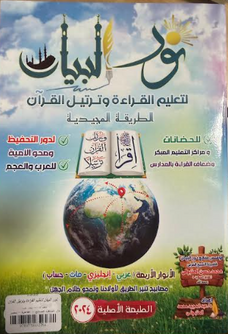Top 15 Tips for Learning Arabic Faster and More Effectively
Learning Arabic is a journey that can open up a world of new opportunities, from connecting with a rich cultural heritage to enhancing career prospects.
However, starting this journey can feel overwhelming due to the unique alphabet, unfamiliar sounds, and different grammatical structures.
But don't worry! With the right approach and mindset, you can transform this challenge into an exciting and manageable adventure. Whether you're learning for travel, business, or personal enrichment, there are numerous strategies and resources available to help you learn Arabic faster and more effectively.
In this article, we'll share 15 practical tips to make your Arabic learning experience smoother and more enjoyable. Let's dive in and discover how you can start speaking and understanding Arabic with confidence and ease!
1. Immerse Yourself in Arabic
One of the best ways to learn Arabic quickly is to immerse yourself in the language. Surround yourself with Arabic by listening to Arabic music, watching Arabic TV shows, and reading Arabic books or articles. This constant exposure helps you get used to the sounds and rhythms of the language, making it easier to pick up new words and phrases.
2. Use Language Learning Apps
In today’s digital age, there are plenty of apps designed to help you learn Arabic. Apps like Duolingo, Rosetta Stone, and Babbel offer interactive lessons that can help you practice vocabulary, grammar, and pronunciation. These apps are great for fitting in some quick study sessions throughout your day.
3. Practice Speaking with Native Speakers
Practicing with native speakers is a fantastic way to improve your Arabic speaking skills. You can find language exchange partners online through platforms like Tandem or HelloTalk. Alternatively, you can join local Arabic-speaking communities or clubs. Speaking regularly with native speakers helps you gain confidence and fluency.
4. Focus on Vocabulary First
Building a strong vocabulary foundation is crucial when learning any new language. Start with the most common words and phrases used in everyday conversation. Flashcards and spaced repetition systems (SRS) like Anki can be very effective tools for memorizing new vocabulary.
5. Learn Arabic Grammar Basics
While vocabulary is important, understanding the basics of Arabic grammar is essential for forming correct sentences. Focus on learning the fundamental grammar rules, such as verb conjugations, noun-adjective agreement, and sentence structure. Grammar guides and online resources can be very helpful.
6. Set Realistic Goals
Setting realistic and achievable goals can keep you motivated. Break down your learning process into smaller milestones, such as learning a certain number of new words each week or practicing speaking for a set amount of time each day. Celebrate your progress along the way!
7. Consistent Practice is Key
Consistency is key to language learning. Try to practice Arabic daily, even if it’s just for a few minutes. Regular practice helps reinforce what you’ve learned and keeps the language fresh in your mind.
8. Join an Arabic Language Course
Enrolling in an Arabic language course can provide structure and guidance in your learning journey. Look for courses offered by local community colleges, language schools, or online platforms like Coursera and Udemy. A structured course can help you stay on track and provide valuable feedback.
9. Use Arabic in Daily Life
Incorporate Arabic into your daily routine as much as possible. Label household items with their Arabic names, write shopping lists in Arabic, or even try thinking in Arabic. The more you use the language in everyday contexts, the more natural it will become.
10. Watch Arabic Videos and Listen to Arabic Podcasts
Watching videos and listening to podcasts in Arabic can improve your listening skills and comprehension. Choose content that interests you, whether it’s news, documentaries, or entertainment. Subtitles can be helpful at first, but try to wean yourself off them as your understanding improves.
11. Practice Writing in Arabic
Writing in Arabic can help reinforce what you’ve learned and improve your ability to recall vocabulary and grammar rules. Start with simple sentences and gradually work your way up to longer texts. Keeping a journal in Arabic can be a great way to practice writing regularly.
12. Study Arabic Culture
Understanding the culture associated with the Arabic language can enhance your learning experience. Learn about Arabic customs, traditions, and history to gain a deeper appreciation for the language. Cultural knowledge can also provide context for the language, making it easier to remember certain phrases and expressions.
13. Use Language Exchange Platforms
Language exchange platforms allow you to connect with native Arabic speakers who want to learn your language. This mutually beneficial arrangement provides both parties with the opportunity to practice and improve. Websites like ConversationExchange.com and MyLanguageExchange.com are great places to start.
14. Take Advantage of Online Resources
There are countless online resources available for learning Arabic. Websites like ArabicPod101, Madinah Arabic, and YouTube channels dedicated to Arabic learning offer lessons, practice exercises, and tips for learners of all levels. Make the most of these free resources to supplement your learning.
15. Stay Positive and Patient
Learning a new language is a marathon, not a sprint. It’s important to stay positive and be patient with yourself. Celebrate your successes, no matter how small, and don’t get discouraged by setbacks. With persistence and the right strategies, you’ll see progress and become more confident in your Arabic skills.
In summary, learning Arabic is an enriching and rewarding journey that opens doors to new cultures, opportunities, and personal growth. By immersing yourself in the language, using modern learning tools, and consistently practicing, you can significantly speed up your progress. Remember to set realistic goals, celebrate your milestones, and stay patient and positive. The key to mastering Arabic lies in persistence and making the learning process enjoyable and engaging.
Additionally, exploring high-quality resources can further enhance your learning experience. Check out our curated collection of books on how to learn Arabic here. These books are packed with valuable insights, practical tips, and exercises designed to help you achieve fluency faster.
Good luck on your Arabic learning journey, and may you find joy and success in mastering this beautiful language. Happy learning!
















